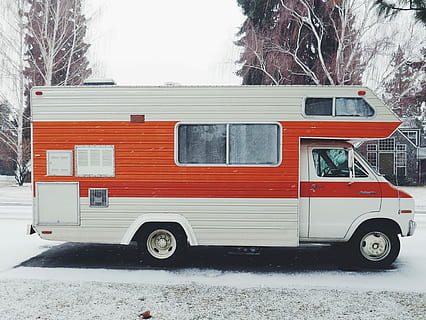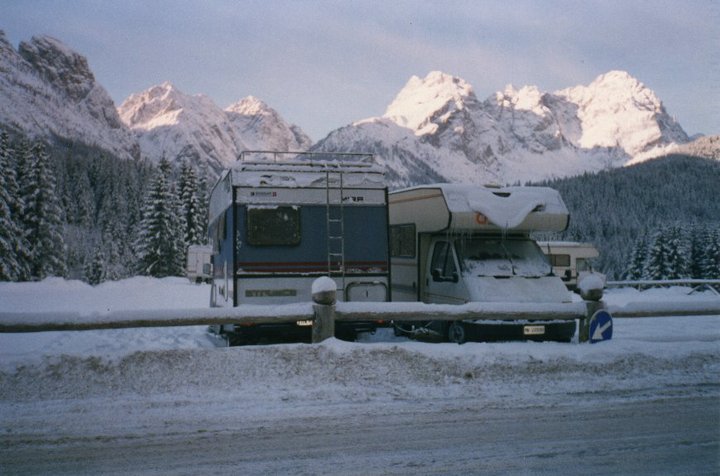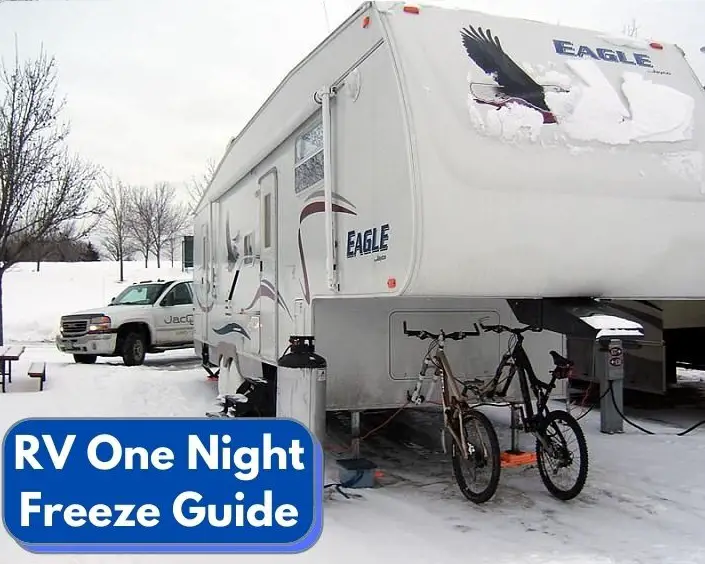Depending on where and when you’re camping, you may run across overnight temperatures that will get into the freezing range, and many RVers wonder if an RV one night freeze can cause damage or if you need to take special precautions.
If the temperature will only drop to freezing levels overnight, you do not need to worry about damage to your RV’s water lines or water tanks during a one-night freeze. Most of your water lines are inside the RV, and the water tanks would take a long time to freeze.
Will An RV One Night Freeze Damage My Water Lines?

A one night freeze should not damage your water lines, as many of them (if not all of them) are located inside your RV where there will be a warmer temperature versus outside.
Will An RV One Night Freeze Damage My Water Tank?
A one night freeze will not damage your water tank, as there will simply be too much volume of water for one night of low temps to actually freeze anything.
Additionally, the water itself will be at a warmer temperature than the outside air to begin with, slowing the freezing process and keeping your tank from freezing.
How Long Will My RV Pipes Last In Freezing Temperatures?
Generally, the rule of thumb is that the outside temp needs to remain below 32 degrees for at least 24 hours before you need to start worrying about your tank or pipes freezing.
There are a few particulars that can affect this though, such as:
- Whether or not your RV’s underbelly is exposed
- If you are running heat inside your RV or not
- How far below freezing the temperature will be dropping
- Wind chill
- Relative humidity
All of these factors can change how fast your RVs water components can freeze, so plan accordingly and take the following preventative measures to be on the safe side.
Steps To Prepare Your RV For A One Night Freeze
Take the following precautions to keep your RV from freezing overnight.

Check The Forecast
This may seem a bit obvious, but to determine what steps are going to be necessary, you’ll need to know how low the temperature is going to get, and how long it’s going to stay below freezing.
Run The Heat
Warming up the inside of your RV with the internal heating system or a small space heater can do wonders for making sure nothing gets damaged during a one night freeze in your RV.
Open Up Your Cabinets
While you’re warming up the RV’s cabin, open your cabinets under the sink to let the warm air get to the water lines to further prevent freezing.
Draw The Curtains And Cover The Windows
Your RV’s windows aren’t great for keeping cold air out, so make sure first that they’re all closed and latched tightly.
Once that’s complete, draw the curtains to provide an extra (small) layer of protection against the cold outside air.
If you’re expecting extremely low temperatures, you can take additional steps to cover the windows from the inside and/or outside with window coverings or even cardboard if you need to.
Disconnect Your Water Hose
If possible, disconnect your water hose and store it where you usually keep it, as trying to thaw out a water hose is a real hassle.
Unlike your lines or tank, an exterior hose has no insulation and is totally exposed to the elements, so it can freeze much more easily.
If you are RVing in cold weather often, consider getting a heated RV water hose or insulated hose.
Turn The Water Off And Relieve The Pressure
Turn the water off at the source (like we mentioned above by disconnecting your water hose), and then run the water at your sink so you can get any remaining water out of the lines.
This reduces the water pressure in the lines so that if it the water freezes, it won’t expand enough to burst your pipes.
Remove Your Water Filters
Remove any accessible water filters that are exposed to outside air and bring them inside your RV. Storing them in the shower is a great spot out of the way (and if they leak at all it’ll be no big deal).
Skirt Your RV
Skirting, or blocking off the underside of your RV will prevent cold air from blowing underneath it, which is particularly important if the underside of your RV isn’t covered as-is.
You can also throw a small space heater under there to keep things warm once you’ve skirted it off, which is a lifesaver if the temperature is predicted to drop into the teens or single digits.
Use Temperature Sensors
Depending on how low the temperature is going to get, you can put temperature sensors in different sensitive places near water lines or tanks and set them to alert you when the temp is dropping too low, allowing you to better monitor the situation.
Surviving A One Night Freeze In Your RV – Wrapping Things Up
Ultimately, if you’re in an RV overnight and the one night freeze isn’t going too far below 32 degrees, you don’t run any risk of your pipes or holding tanks getting damaged.
You can follow some or all of the tips above depending on how low the temp is going and how long it’s going to stay there to make sure nothing freezes.
Do you have any additional tips for your fellow RVers to survive a one night freeze? Let us know in the comments below.

